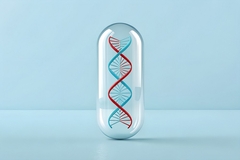Wageningen Research Provides New Insight Into Lutein Bioavailability

06 Oct 2014 --- Lutein from dry, resuspended powder is absorbed comparably to that from ready-made (dairy) drinks. This is the key finding from clinical and lab research conducted by Wageningen UR (University & Research centre) and Newtricious R&D. The work, published in the July edition of the International Journal of Food Sciences and Nutrition, has resulted in the market introduction of a long-life lutein-enriched food product to help those struggling with Age-Related Macula Degeneration (AMD).
The research included a 6-week, randomized, controlled study – set up by researchers from the department of Human Nutrition at Wageningen University – in which 100 healthy young subjects consumed one of four beverages. These included a ‘plain’ buttermilk control beverage or one of three lutein-enriched egg-yolk buttermilk beverages: a fresh version; a dried version or one made from dried individual components. The fresh and both dried versions of the egg-yolk beverage significantly increased serum lutein levels after six weeks of consumption, compared to the control beverage. Bioavailability of lutein, measured via changes in blood plasma lutein levels after consumption, from the three egg-yolk-buttermilk beverages was somewhat lower than for fresh egg-yolk. However, absorption remained excellent and the resulting product appears very suitable for commercial use.
The researchers also measured the subjects´ serum cholesterol, as egg-yolk contains relatively high levels of this compound. However, no significant differences in total and ´unhealthy´ LDL serum cholesterol levels were seen after consumption of the lutein-enriched egg-yolk beverages compared to the control drink.
The powder form of the lutein-enriched egg-yolk buttermilk beverage was created via an advanced spray-drying process, developed by experts from Wageningen UR Food & Biobased Research. The experts started the project by carrying out a risk-based analysis of the development process, which facilitated a short project lead time. They optimized the spray-drying process by significantly improving the powder’s recipe, ingredients and solubility. These optimization steps were guided by studies with a Caco-2 epithelial cell line to analyse lutein uptake from various formulations following a digestion simulation. They also developed and implemented an innovative method to rapidly analyse lutein in egg yolk and egg powder – essential when making the tiny incremental adjustments involved in optimising a formulation or manufacturing process. Finally, the researchers transferred the optimized drying protocol to Adriaan Goede BV – the company to which the egg-yolk drying process has been outsourced.
The collaboration with Wageningen UR has allowed Newtricious to make an early market introduction of an innovative food product to combat Age-Related Macula Degeneration (AMD) – the leading cause of blindness in people over 55 in Western countries. “The transformation from Newtricious’ original lutein-enriched liquid dairy drink into a high-quality powder has taken only three years”, says Miriam Quataert, Senior Researcher Food Design & Structuring at Food & Biobased Research. “Fresh, liquid, lutein-enriched egg-yolk beverages have a shelf life of only two to three weeks. Drying extends the life to at least six months, offering sustainability and market advantages, and reducing transport and packaging costs.”
A description of the clinical research can be found in the paper Bioavailability of lutein from a lutein-enriched egg-yolk beverage and its dried re-suspended versions (M. Bunger et al), published July 14, 2014 in the International Journal of Food Sciences and Nutrition.












